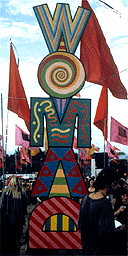
Twenty years of Womad is a mighty achievement. As well as being the most wildly eclectic and user-friendly festival of the year, Womad has done more than most events to promote different musical styles from around the world. This year's line-up was as varied as ever, but what it needed was one truly remarkable performance to mark the anniversary.
It finally happened, on Sunday afternoon, with the most gloriously cheerful comeback I can remember, coming from a 10-piece band from West Africa. Orchestra Baobab dominated Senegalese music back in the 1970s, but by the 80s they had been pushed aside. Now they have reformed and recorded their first new album in 15 years. This was a thrilling preview.
Baobab were remarkable for their enthusiastic blend of Cuban influences and Senegalese rhythms, for their four lead singers (three originals now joined by the stirring "little boy" of the band, Assane Mboup), and for guitarist Barthelemy Attiso, who played like a virtuoso with echoes of Hank Marvin. The band traded rolling, melodic old favourites with strong new material from Mboup, all dressed up with fine saxophone work and inspired guitar breaks from Attiso.
African music dominated Womad this year, just as it did two decades ago. There was an exuberant demonstration of soukous dance styles from the Congo, from the hefty Kanda Bongo Man, and a slinky, stirring example of how ancient can be mixed with modern from Mali's inventive Issa Bagayogo. An exponent of the traditional, guitar-like kamel ngoni, he matched his sturdy, brooding vocals against heavy bass, guitar and electronic effects. There was a more dated mix of Africa and technology from Uganda's Geoffrey Oryema, who seems keen to squander his fine high vocals on Euro-pop, and a tame appearance from the great Rachid Taha.
There were fewer Latin bands than in previous years, but Mexico's Los De Abajo made a gloriously manic appearance, mixing anything from rap, jazz-funk to Mexican traditional styles with political lyrics and frantic dance routines worthy of early Madness. From Europe, the star attraction was the impossibly tall, elegant and soulful Mariza, proving that Portuguese fado "is not always melancholic".
There was even a good batch of British-based bands. Echo and the Bunnymen, who played at the first Womad, returned looking scruffier than ever but sounded tremendous reviving Killing Moon or Seven Seas. London-Greek bluesman Little George Sueref demonstrated his remarkable high and soulful vocals. And there was an impressive set from London-based Malagasy guitarist Modeste Hughes, who played at the Radio 3 World on Your Street tent, which promotes little-known local musicians. Surprises like that have helped keep Womad so special. Happy birthday.

